
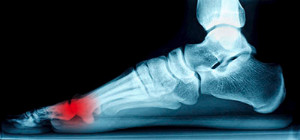 One of the functions of the sesamoid bones is leverage. The sesamoids are attached to tendons in the foot, and they are able to provide additional force while pushing off during a running or jumping activity. The sesamoids are located within ligaments under the big toe, and pain can be felt on the ball of the foot when the sesamoids are injured or inflamed. Sesamoiditis is a condition that occurs when the sesamoid bones become inflamed, and is common among runners and dancers. The healing process generally begins with stopping the activity that caused the injury, and it may help to elevate the affected foot. It is beneficial to wear shoes that fit correctly, and the amount of rest needed can be determined by the severity of the condition. If you have pain in this part of your foot, please consult with a podiatrist who can determine if this is sesamoiditis, and offer you the correct treatment options.
One of the functions of the sesamoid bones is leverage. The sesamoids are attached to tendons in the foot, and they are able to provide additional force while pushing off during a running or jumping activity. The sesamoids are located within ligaments under the big toe, and pain can be felt on the ball of the foot when the sesamoids are injured or inflamed. Sesamoiditis is a condition that occurs when the sesamoid bones become inflamed, and is common among runners and dancers. The healing process generally begins with stopping the activity that caused the injury, and it may help to elevate the affected foot. It is beneficial to wear shoes that fit correctly, and the amount of rest needed can be determined by the severity of the condition. If you have pain in this part of your foot, please consult with a podiatrist who can determine if this is sesamoiditis, and offer you the correct treatment options.
Sesamoiditis is an unpleasant foot condition characterized by pain in the balls of the feet. If you think you’re struggling with sesamoiditis, contact Dr. Stephan J. LaPointe of Georgia Foot & Ankle Specialists . Our doctor will treat your condition thoroughly and effectively.
Sesamoiditis
Sesamoiditis is a condition of the foot that affects the ball of the foot. It is more common in younger people than it is in older people. It can also occur with people who have begun a new exercise program, since their bodies are adjusting to the new physical regimen. Pain may also be caused by the inflammation of tendons surrounding the bones. It is important to seek treatment in its early stages because if you ignore the pain, this condition can lead to more serious problems such as severe irritation and bone fractures.
Causes of Sesamoiditis
Treatment for sesamoiditis is non-invasive and simple. Doctors may recommend a strict rest period where the patient forgoes most physical activity. This will help give the patient time to heal their feet through limited activity. For serious cases, it is best to speak with your doctor to determine a treatment option that will help your specific needs.
If you have any questions please feel free to contact our office located in Rome, GA . We offer the newest diagnostic and treatment technologies for all your foot and ankle needs.
 Dangers to the feet are a concern among diabetic patients. Complications could arise that affect the ability to feel cuts, bruises, and wounds on the feet, and can cause infections. A method that can keep the feet healthy can include monitoring glucose levels. Elevated sugar levels can be what causes a loss of feeling in the feet, and keeping a watchful eye may be helpful in preventing wounds and ulcers from developing. Many diabetic patients find it beneficial to place a mirror on the floor that can help to inspect the bottom of the feet. The feet need to be washed daily, and the toenails trimmed properly. There are many ways to protect the feet from diabetes. If you have this condition, it is suggested that you are under the care of a podiatrist who can help you to manage this ailment.
Dangers to the feet are a concern among diabetic patients. Complications could arise that affect the ability to feel cuts, bruises, and wounds on the feet, and can cause infections. A method that can keep the feet healthy can include monitoring glucose levels. Elevated sugar levels can be what causes a loss of feeling in the feet, and keeping a watchful eye may be helpful in preventing wounds and ulcers from developing. Many diabetic patients find it beneficial to place a mirror on the floor that can help to inspect the bottom of the feet. The feet need to be washed daily, and the toenails trimmed properly. There are many ways to protect the feet from diabetes. If you have this condition, it is suggested that you are under the care of a podiatrist who can help you to manage this ailment.
Diabetic foot care is important in preventing foot ailments such as ulcers. If you are suffering from diabetes or have any other concerns about your feet, contact Dr. Stephan J. LaPointe from Georgia Foot & Ankle Specialists . Our doctor can provide the care you need to keep you pain-free and on your feet.
Diabetic Foot Care
Diabetes affects millions of people every year. The condition can damage blood vessels in many parts of the body, especially the feet. Because of this, taking care of your feet is essential if you have diabetes, and having a podiatrist help monitor your foot health is highly recommended.
The Importance of Caring for Your Feet
Patients with diabetes should have their doctor monitor their blood levels, as blood sugar levels play such a huge role in diabetic care. Monitoring these levels on a regular basis is highly advised.
It is always best to inform your healthcare professional of any concerns you may have regarding your feet, especially for diabetic patients. Early treatment and routine foot examinations are keys to maintaining proper health, especially because severe complications can arise if proper treatment is not applied.
If you have any questions please feel free to contact our office located in Rome, GA . We offer the newest diagnostic and treatment technologies for all your foot and ankle needs.
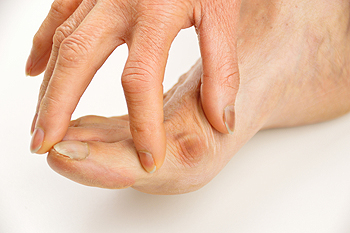 A common foot condition that develops in the front of the foot is known as a bunion. It appears as a large bump on the side of the big toe, and it can be uncomfortable while wearing shoes. Additionally, large bunions can push the second toe into the toe next to it, and this can be a result of changing foot structure. Bunions can develop due to genetics, or from wearing shoes that do not have adequate room for the toes to move freely in. An effective yoga pose that can keep the foot strong is known as downward dog. This is done by keeping the hands and feet flat on the floor while extending the lower torso into the air. Additionally, the toes can be strengthened by performing a seated forward bend. If you would like more information about what stretches and yoga poses can benefit bunions, please consult with a podiatrist.
A common foot condition that develops in the front of the foot is known as a bunion. It appears as a large bump on the side of the big toe, and it can be uncomfortable while wearing shoes. Additionally, large bunions can push the second toe into the toe next to it, and this can be a result of changing foot structure. Bunions can develop due to genetics, or from wearing shoes that do not have adequate room for the toes to move freely in. An effective yoga pose that can keep the foot strong is known as downward dog. This is done by keeping the hands and feet flat on the floor while extending the lower torso into the air. Additionally, the toes can be strengthened by performing a seated forward bend. If you would like more information about what stretches and yoga poses can benefit bunions, please consult with a podiatrist.
If you are suffering from bunion pain, contact Dr. Stephan J. LaPointe of Georgia Foot & Ankle Specialists . Our doctor can provide the care you need to keep you pain-free and on your feet.
What Is a Bunion?
Bunions are painful bony bumps that usually develop on the inside of the foot at the joint of the big toe. As the deformity increases over time, it may become painful to walk and wear shoes. Women are more likely to exacerbate existing bunions since they often wear tight, narrow shoes that shift their toes together. Bunion pain can be relieved by wearing wider shoes with enough room for the toes.
Causes
Symptoms
In order to diagnose your bunion, your podiatrist may ask about your medical history, symptoms, and general health. Your doctor might also order an x-ray to take a closer look at your feet. Nonsurgical treatment options include orthotics, padding, icing, changes in footwear, and medication. If nonsurgical treatments don’t alleviate your bunion pain, surgery may be necessary.
If you have any questions, please feel free to contact our office located in Rome, GA . We offer the newest diagnostic and treatment technologies for all your foot care needs.
The forefoot refers to the front part of the foot and includes the metatarsal bones, toe bones, and their connective tissues. There are many different conditions which could cause pain in the forefoot. Metatarsalgia is a general term used to refer to pain and tenderness in the ball of the foot. Potential causes of metatarsalgia include toe misalignment, arthritis, or wearing poorly fitted shoes. Sesamoiditis is a painful inflammation of the sesamoid bones located beneath the big toe joint. Morton’s neuroma is a painful condition caused by a pinched nerve between the toes. Toe pain may be caused by arthritis, bunions, hammertoes, or gout. If you have any pain in your forefoot, it is suggested that you consult with a podiatrist, who can diagnose the problem and offer effective treatments.
Foot Pain
Foot pain can be extremely painful and debilitating. If you have a foot pain, consult with Dr. Stephan J. LaPointe from Georgia Foot & Ankle Specialists . Our doctor will assess your condition and provide you with quality foot and ankle treatment.
Causes
Foot pain is a very broad condition that could be caused by one or more ailments. The most common include:
Diagnosis
To figure out the cause of foot pain, podiatrists utilize several different methods. This can range from simple visual inspections and sensation tests to X-rays and MRI scans. Prior medical history, family medical history, and any recent physical traumatic events will all be taken into consideration for a proper diagnosis.
Treatment
Treatment depends upon the cause of the foot pain. Whether it is resting, staying off the foot, or having surgery; podiatrists have a number of treatment options available for foot pain.
If you have any questions, please feel free to contact our office located in Rome, GA . We offer the newest diagnostic and treatment technologies for all your foot care needs.
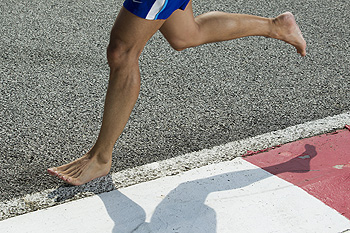 Excessively sweaty feet can be an unpleasant and annoying condition. There are various over-the-counter products available that can help reduce foot sweat. Antiperspirant products in the form of sprays, powders, and lotions can help keep the feet dry. Foot powders and sneaker liners can absorb excess sweat while you go about your day. Your footwear is also an important factor to consider. Wearing shoes made of breathable materials and moisture-wicking socks may help reduce your foot sweat as well. If over-the-counter treatments are not effective in managing your foot sweat, you may have plantar hyperhidrosis, a medical condition that causes the feet to sweat excessively. A podiatrist can diagnose plantar hyperhidrosis and recommend that best course of treatment for you.
Excessively sweaty feet can be an unpleasant and annoying condition. There are various over-the-counter products available that can help reduce foot sweat. Antiperspirant products in the form of sprays, powders, and lotions can help keep the feet dry. Foot powders and sneaker liners can absorb excess sweat while you go about your day. Your footwear is also an important factor to consider. Wearing shoes made of breathable materials and moisture-wicking socks may help reduce your foot sweat as well. If over-the-counter treatments are not effective in managing your foot sweat, you may have plantar hyperhidrosis, a medical condition that causes the feet to sweat excessively. A podiatrist can diagnose plantar hyperhidrosis and recommend that best course of treatment for you.
If you are suffering from hyperhidrosis contact Dr. Stephan J. LaPointe of Georgia Foot & Ankle Specialists . Our doctor can provide the care you need to attend to all of your foot and ankle needs.
Hyperhidrosis of the Feet
Hyperhidrosis is a rare disorder that can cause people to have excessive sweating of their feet. This can usually occur all on its own without rigorous activity involved. People who suffer from hyperhidrosis may also experience sweaty palms.
Although it is said that sweating is a healthy process meant to cool down the body temperature and to maintain a proper internal temperature, hyperhidrosis may prove to be a huge hindrance on a person’s everyday life.
Plantar hyperhidrosis is considered to be the main form of hyperhidrosis. Secondary hyperhidrosis can refer to sweating that occurs in areas other than the feet or hands and armpits. Often this may be a sign of it being related to another medical condition such as menopause, hyperthyroidism and even Parkinson’s disease.
In order to alleviate this condition, it is important to see your doctor so that they may prescribe the necessary medications so that you can begin to live a normal life again. If this is left untreated, it is said that it will persist throughout an individual’s life.
A last resort approach would be surgery, but it is best to speak with your doctor to find out what may be the best treatment for you.
If you have any questions please feel free to contact our office located in Rome, GA . We offer the newest diagnostic and treatment technologies for all your foot and ankle needs.
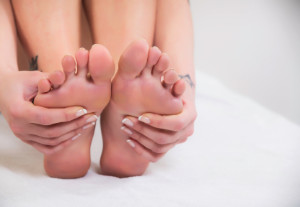 Plantar fasciitis is a condition in which the plantar fascia, a ligament that runs along the bottom of the foot, becomes inflamed. This can cause a stabbing pain in the heel. Stretching the foot may help reduce the pain associated with plantar fasciitis. Did you know that you can stretch the feet while doing yoga? For example, while standing, lift your right heel off of the ground and roll onto your right toes. Then place your right heel back onto the ground and repeat on the opposite foot. Do this several times to stretch the arch area. For more information about the benefits of yoga and stretching for plantar fasciitis pain, please consult with a podiatrist.
Plantar fasciitis is a condition in which the plantar fascia, a ligament that runs along the bottom of the foot, becomes inflamed. This can cause a stabbing pain in the heel. Stretching the foot may help reduce the pain associated with plantar fasciitis. Did you know that you can stretch the feet while doing yoga? For example, while standing, lift your right heel off of the ground and roll onto your right toes. Then place your right heel back onto the ground and repeat on the opposite foot. Do this several times to stretch the arch area. For more information about the benefits of yoga and stretching for plantar fasciitis pain, please consult with a podiatrist.
Plantar fasciitis can be very painful and inconvenient. If you are experiencing heel pain or symptoms of plantar fasciitis, contact Dr. Stephan J. LaPointe from Georgia Foot & Ankle Specialists . Our doctor can provide the care you need to keep you pain-free and on your feet.
What Is Plantar Fasciitis?
Plantar fasciitis is the inflammation of the thick band of tissue that runs along the bottom of your foot, known as the plantar fascia, and causes mild to severe heel pain.
What Causes Plantar Fasciitis?
How Can It Be Treated?
While very treatable, plantar fasciitis is definitely not something that should be ignored. Especially in severe cases, speaking to your doctor right away is highly recommended to avoid complications and severe heel pain. Your podiatrist can work with you to provide the appropriate treatment options tailored to your condition.
If you have any questions please feel free to contact our office located in Rome, GA . We offer the newest diagnostic and treatment technologies for all your foot and ankle needs.
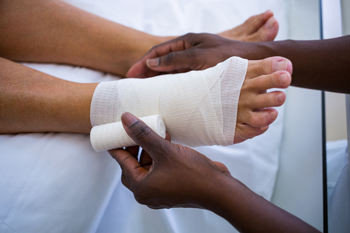 An ulcer that develops on the foot is a wound that may not heal. This type of ailment can cause severe pain and discomfort and is common among diabetic patients. Redness on and around the affected area is often the first sign of a foot wound, and additional symptoms can include an unpleasant odor and possible drainage. There are several reasons why foot wounds may occur. These can consist of living a sedentary lifestyle, nerve damage, or circulation problems. Additionally, medical conditions such as high blood pressure and diabetes may make developing wounds on the feet more likely. If you are prone to foot wounds, it is strongly suggested that you are under the care of a podiatrist who can effectively treat this problem.
An ulcer that develops on the foot is a wound that may not heal. This type of ailment can cause severe pain and discomfort and is common among diabetic patients. Redness on and around the affected area is often the first sign of a foot wound, and additional symptoms can include an unpleasant odor and possible drainage. There are several reasons why foot wounds may occur. These can consist of living a sedentary lifestyle, nerve damage, or circulation problems. Additionally, medical conditions such as high blood pressure and diabetes may make developing wounds on the feet more likely. If you are prone to foot wounds, it is strongly suggested that you are under the care of a podiatrist who can effectively treat this problem.
Wound care is an important part in dealing with diabetes. If you have diabetes and a foot wound or would like more information about wound care for diabetics, consult with Dr. Stephan J. LaPointe from Georgia Foot & Ankle Specialists . Our doctor will assess your condition and provide you with quality foot and ankle treatment.
What Is Wound Care?
Wound care is the practice of taking proper care of a wound. This can range from the smallest to the largest of wounds. While everyone can benefit from proper wound care, it is much more important for diabetics. Diabetics often suffer from poor blood circulation which causes wounds to heal much slower than they would in a non-diabetic.
What Is the Importance of Wound Care?
While it may not seem apparent with small ulcers on the foot, for diabetics, any size ulcer can become infected. Diabetics often also suffer from neuropathy, or nerve loss. This means they might not even feel when they have an ulcer on their foot. If the wound becomes severely infected, amputation may be necessary. Therefore, it is of the upmost importance to properly care for any and all foot wounds.
How to Care for Wounds
The best way to care for foot wounds is to prevent them. For diabetics, this means daily inspections of the feet for any signs of abnormalities or ulcers. It is also recommended to see a podiatrist several times a year for a foot inspection. If you do have an ulcer, run the wound under water to clear dirt from the wound; then apply antibiotic ointment to the wound and cover with a bandage. Bandages should be changed daily and keeping pressure off the wound is smart. It is advised to see a podiatrist, who can keep an eye on it.
If you have any questions, please feel free to contact our office located in Rome, GA . We offer the newest diagnostic and treatment technologies for all your foot care needs.
 Pregnant women often experience foot pain, and a common ailment during pregnancy can include leg cramps. They may develop as a result of shortened calf muscles, and they can cause severe pain and discomfort. Additional reasons why foot cramps can develop may be from a vitamin deficiency, or an imbalance in electrolytes. This type of pain generally occurs in the third trimester, and will gradually diminish once the baby is born. Relief may be attained when the affected leg is stretched, and the foot is rotated several times in clockwise and counterclockwise directions. If you would like additional information on why leg cramps can occur during pregnancy, and how to prevent them, please consult with a podiatrist.
Pregnant women often experience foot pain, and a common ailment during pregnancy can include leg cramps. They may develop as a result of shortened calf muscles, and they can cause severe pain and discomfort. Additional reasons why foot cramps can develop may be from a vitamin deficiency, or an imbalance in electrolytes. This type of pain generally occurs in the third trimester, and will gradually diminish once the baby is born. Relief may be attained when the affected leg is stretched, and the foot is rotated several times in clockwise and counterclockwise directions. If you would like additional information on why leg cramps can occur during pregnancy, and how to prevent them, please consult with a podiatrist.
Pregnant women with swollen feet can be treated with a variety of different methods that are readily available. For more information about other cures for swollen feet during pregnancy, consult with Dr. Stephan J. LaPointe from Georgia Foot & Ankle Specialists . Our doctor will attend to all of your foot and ankle needs.
What Foot Problems Can Arise During Pregnancy?
One problem that can occur is overpronation, which occurs when the arch of the foot flattens and tends to roll inward. This can cause pain and discomfort in your heels while you’re walking or even just standing up, trying to support your baby.
Another problem is edema, or swelling in the extremities. This often affects the feet during pregnancy but tends to occur in the later stages.
How Can I Keep My Feet Healthy During Pregnancy?
If you have any questions please feel free to contact our office located in Rome, GA . We offer the newest diagnostic and treatment technologies for all your foot and ankle needs.